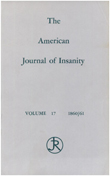Blood dyscrasias with carbamazepine and valproate: a pharmacoepidemiological study of 2,228 patients at risk
Abstract
OBJECTIVE: The purpose of this study was to determine the occurrence of leukopenia and other blood dyscrasias associated with psychiatric use of carbamazepine and valproate. METHOD: Rates of WBC counts of 3,000- 4,000/mm3 (moderate leukopenia) and < 3,000/mm3 (severe leukopenia), platelet counts of < 100,000/mm3, and hematocrit < 30% were identified among 2,228 treated patients at risk among 11,720 patients admitted to McLean Hospital over 4 years (1989-1993). Patients who received carbamazepine or valproate and had a blood dyscrasia not associated with a relevant medical condition were compared to patients treated with imipramine or desipramine. RESULTS: Of 977 patients treated with carbamazepine, 2.1% experienced leukopenia (16 moderate cases, five severe). Time to 50% risk was 16 days, and recovery occurred within about 6 days after carbamazepine was stopped. For 1,251 patients given valproate, the occurrence of leukopenia was 0.4% (three moderate cases, two severe). The occurrence of leukopenia in 1,031 patients given the tricyclic antidepressants was 0.3% (two moderate cases, one severe). The observed occurrence of moderate leukopenia with carbamazepine was 6.9 and 7.3 times higher than that with valproate and antidepressants, respectively. CONCLUSIONS: Severe blood dyscrasias were uncommon in psychiatric patients given carbamazepine and were about as rare with valproate as with imipramine or desipramine. Most important, in this cohort of 2,228 patients exposed to carbamazepine and valproate, there were no life-threatening cases.
Access content
To read the fulltext, please use one of the options below to sign in or purchase access.- Personal login
- Institutional Login
- Sign in via OpenAthens
- Register for access
-
Please login/register if you wish to pair your device and check access availability.
Not a subscriber?
PsychiatryOnline subscription options offer access to the DSM-5 library, books, journals, CME, and patient resources. This all-in-one virtual library provides psychiatrists and mental health professionals with key resources for diagnosis, treatment, research, and professional development.
Need more help? PsychiatryOnline Customer Service may be reached by emailing [email protected] or by calling 800-368-5777 (in the U.S.) or 703-907-7322 (outside the U.S.).



